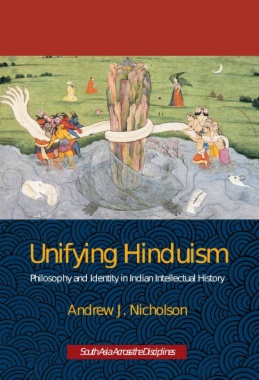Some postcolonial theorists argue that the idea of a single system of belief known as "Hinduism" is a creation of nineteenth-century British imperialists. Andrew J. Nicholson introduces another perspective: although a unified Hindu identity is not as ancient as some Hindus claim, it has its roots in innovations within South Asian philosophy from the fourteenth to seventeenth centuries. During this time, thinkers treated the philosophies of Vedanta, Samkhya, and Yoga, along with the worshippers of Visnu, Siva, and Sakti, as belonging to a single system of belief and practice. Instead of seeing such groups as separate and contradictory, they re-envisioned them as separate rivers leading to the ocean of Brahman, the ultimate reality.
Drawing on the writings of philosophers from late medieval and early modern traditions, including Vijnanabhiksu, Madhava, and Madhusudana Sarasvati, Nicholson shows how influential thinkers portrayed Vedanta philosophy as the ultimate unifier of diverse belief systems. This project paved the way for the work of later Hindu reformers, such as Vivekananda, Radhakrishnan, and Gandhi, whose teachings promoted the notion that all world religions belong to a single spiritual unity. In his study, Nicholson also critiques the way in which Eurocentric conceptslike monism and dualism, idealism and realism, theism and atheism, and orthodoxy and heterodoxyhave come to dominate modern discourses on Indian philosophy.
- CONTENTS
- ACKNOWLEDGMENTS
- ABBREVIATIONS
- 1. INTRODUCTION
- Contesting the Unity of Hinduism
- Vijñanabhiks�u and His Late Medieval Milieu
- Doxography and Method
- Premodern Philosophy in a Postcolonial World
- 2. AN ALTERNATIVE HISTORYOF VEDĀNTA
- Vedanta and Orientalist Historiography
- Early Bhedabheda Vedanta
- Bhedabheda Vedanta After Sankara
- The Future of Bhedabheda Vedanta
- 3. VIJÑĀNABHIKSU’S “DIFFERENCEAND NON-DIFFERENCE” VEDĀNTA
- The Meaning of “Bhedabheda”
- Self and Brahman as Part and Whole
- Brahman’s Causality in Advaita and Bhedabheda Vedanta
- Bhedabheda and the Unity of Philosophies
- 4. A HISTORY OF GOD IN SĀMKHYA AND YOGA
- Samkhya: An Atheist Philosophy?
- Theism in Early Samkhya and the Puranas
- Atheism and Theism in “Classical” Samkhya
- Samkhya and Yoga
- 5. READING AGAINST THE GRAIN OF THE SĀMKHYASŪTRAS
- Atheism in the Samkhyasutras
- Kapila’s “Bold Assertion” as Speech Act
- Degrees of Deception in Samkhya and the Puranas
- Disproving God in the Samkhyasutras
- 6. YOGA, PRAXIS, AND LIBERATION
- The Excellence of the Yogic Path
- Karma and Embodied Liberation
- The Unity of Yoga and Vedanta Soteriologies
- 7. VEDĀNTA AND SĀMKHYA IN THE ORIENTALIST IMAGINATION
- Indian Philosophy and the Critique of Orientalism
- Colebrooke and Gough: The Struggle For the Essence of Vedanta
- Paul Deussen and the Influence of German Idealism
- Richard Garbe: Samkhya as the Foundation of Indian Philosophy
- Orientalism and Modern Hindu Thought
- 8. DOXOGRAPHY, CLASSIFICATORY SCHEMES, AND CONTESTED HISTORIES
- Doxography as a Genre
- Early Models for Doxography in India: Cattanar and Bhaviveka
- Haribhadra, Jainism, and The Six Systems
- Madhava and the Influenceof Advaita Doxography
- Madhusudana Sarasvati: Foreignness and the Philosophical Other
- AFFIRMERS (ĀSTIKAS) AND DENIERS (NĀSTIKAS) IN INDIAN HISTORY
- Toward a Comparative Heresiology
- The Meaning of Astika and Nastika
- Perspectives from the Jainas, Buddhists, and Grammarians
- Beyond Orthodoxy and Heterodoxy
- Astika and Nastika in the Late Medieval Period
- HINDU UNITY ANDTHE NON-HINDU OTHER
- Inclusivism and Hindu Toleration
- Decoding Late Medieval Doxography
- The Absence of Islam
- Hinduism: A Modern Invention?
- Communalism, Universalism, and Hindu Identity
- NOTES
- BIBLIOGRAPHY
- INDEX

